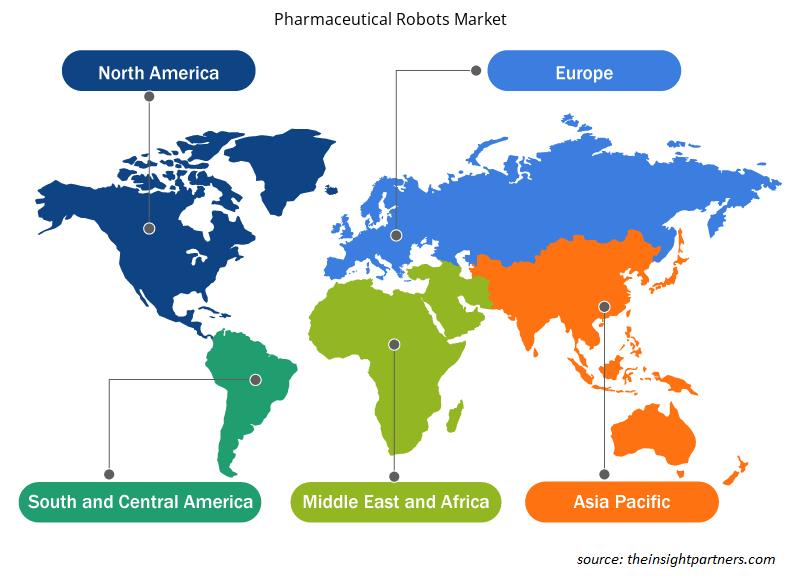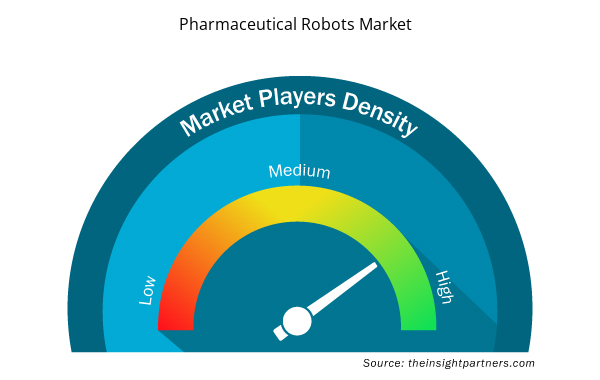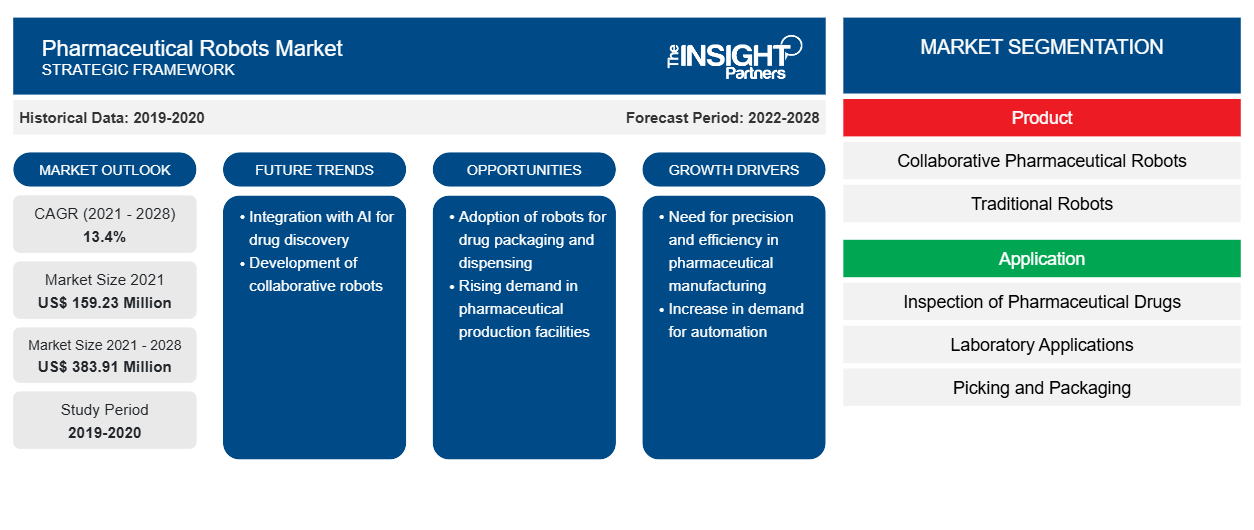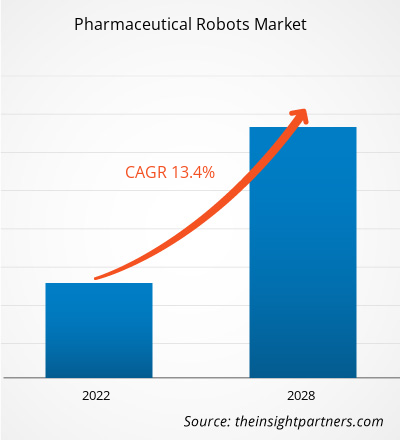[調査レポート] 製薬ロボット市場は、2021年の1億5,923万米ドルから2028年には3億8,391万米ドルに達すると予測されており、2021年から2028年にかけて13.4%のCAGRで成長すると予想されています。
製薬業界では、医薬品の製造において効率的で正確な精度が求められます。そのため、医薬品製造にロボットを使用すると、品質が向上し、コストと時間が削減されます。ロボットは、充填、検査、包装、研究、および個別化医薬品の製造において有利であることが証明されています。ロボット システムは、複数の動作軸を持ち、任意の機能を実行するようにプログラムできるタイプの自動化です。
このレポートは、市場動向、技術の進歩、市場のダイナミクス、世界中の主要な市場プレーヤーの競合状況分析など、さまざまなパラメータに重点を置いて、製薬ロボット市場の洞察と詳細な分析を提供します。また、すべての地域の市場に対するCOVID-19パンデミックの影響も含まれています。パンデミックの影響と世界的な研究活動の減少は、製薬ロボット市場のいくつかの企業の業務と財務実行にも悪影響を及ぼしています。世界獣疫事務局(OIE)は、進行中の研究や、COVID-19が動物の健康と家禽の公衆衛生に及ぼすその他の影響についての研究を支援しています。この組織は、リスク評価、リスク管理、リスクコミュニケーションにも役立ちます。OIEは、これらの活動を調整するためにインシデント調整システムを導入しました。さらに、COVID-19パンデミックとそれに伴うロックダウンの実施は、世界のさまざまな国の家畜および家禽部門に大きな影響を与えています。市場チェーンの開放と、地方自治体が配送システムのボトルネックを解消するために講じた追加措置により、需要と供給のギャップは徐々に縮小することが分かっています。さらに、その影響は長期にわたり、この分野の生活、雇用、経済全体に大きな影響を及ぼすことが予想されます。製薬ロボット市場は、投与量、疾患、技術、地域に基づいてセグメント化されています。地域に基づいて、市場は北米、ヨーロッパ、アジア太平洋、中東およびアフリカ、南米および中米にセグメント化されています。
市場分析
要件に合わせてレポートをカスタマイズする
このレポートの一部、国レベルの分析、Excelデータパックなど、あらゆるレポートを無料でカスタマイズできます。また、スタートアップや大学向けのお得なオファーや割引もご利用いただけます。
- このレポートの主要な市場動向を入手してください。この無料サンプルには、市場動向から見積もりや予測に至るまでのデータ分析が含まれます。
クラウドロボティクスのトレンド
クラウド ロボティクスは、クラウド コンピューティング、クラウド ストレージ、および統合インフラストラクチャと共有サービスの利点を中心としたその他のインターネット テクノロジに根ざした、ロボティクスの新しい分野です。ロボットをクラウドに接続すると、計算能力、ストレージ、および通信が向上します。クラウド ロボットは相互に通信するため、操作は簡単に実行できます。
Google Cloud Robotics Platform は、AI、ロボット工学、クラウドを組み合わせて、クラウドに接続された協働ロボットを使用する自動化ソリューションのエコシステムを開くことを可能にします。AI と機械学習サービスに加えて、ロボットは製造業の非常に動的な環境でプロセスを効率的に実行できるようになります。さらに、業界では、クラウドは大量のデータを処理する味方です。たとえば、バイオ医薬品会社の Exscientia と Celgene は、がんや自己免疫疾患の治療薬の発見を加速するために 2019 年に 1,964 万ユーロの契約を発表しました。2020 年には、COVID-19 の治療薬の候補を見つけるために他の企業と協力することも発表しました。その結果、同社は現在、ヒトでテストに成功した薬剤やその他の化学物質を含む分子のパッケージにアクセスできるようになりました。同社は、ウイルスと戦うことができる可能性のある薬剤のリストをスキャンするつもりでした。 Exscientia の技術は大規模なデータベースをスキャンし、どの化合物が副作用を生じず、望ましい目標を達成できるかを正確に予測できます。同様に、2020 年には別の製薬会社であるベーリンガーインゲルハイムがバイオテクノロジー会社である Click Therapeutics と提携し、5 億ドルのデジタル治療を生み出しました。より正確には、両社は認知障害のある統合失調症患者を支援するモバイル アプリケーションの開発と配布で協力する計画を立てていました。また、IBM は、AI、クラウド コンピューティング、ロボット工学を使用して研究者の自宅から薬を開発する化学研究所 RoboRXN を作成しました。
適切なセキュリティ プロトコルを備えたクラウドベースのソフトウェアを導入することで、統合と自動化を容易にすることができます。クラウドベースのソフトウェアを使用すると、企業の書類作業が軽減され、データの管理が容易になります。そのため、クラウド ロボティクスは、将来、製薬ロボット市場のトレンドになると予想されています。
製品ベースの洞察
製品に基づいて、製薬ロボット市場は協働型製薬ロボットと従来型ロボットに分類されます。2021年には、協働型製薬ロボットセグメントが最大の市場シェアを占めると予測されていますが、予測期間中、従来型ロボットは市場で最も高いCAGRを記録すると予想されています。このセグメントの成長は、分配、仕分け、キット組み立て、軽機械管理、および包装などに関連するより伝統的なアプリケーションでのロボットの使用の増加に起因しています。
アプリケーションベースの洞察
用途別に見ると、医薬品ロボット市場は医薬品の検査、実験室用途、ピッキングと梱包に分類されます。医薬品の検査セグメントは2021年に市場で最大のシェアを占め、予測期間中に市場で最も高いCAGRを記録すると予測されています。
エンドユーザーベースの洞察
エンドユーザーに基づいて、製薬ロボット市場は製薬会社、研究室、契約研究機関に分割されています。製薬会社セグメントは2021年に市場で最大のシェアを占める一方、研究室セグメントは予測期間中に市場で最も高いCAGRを記録すると予測されています。
製薬ロボット市場のプレーヤーは、製品の発売や拡張などの有機的な戦略を採用して、世界中で事業展開と製品ポートフォリオを拡大し、高まる需要に対応しています。
製薬ロボット市場の地域別洞察
予測期間を通じて医薬品ロボット市場に影響を与える地域的な傾向と要因は、Insight Partners のアナリストによって徹底的に説明されています。このセクションでは、北米、ヨーロッパ、アジア太平洋、中東、アフリカ、南米、中米にわたる医薬品ロボット市場のセグメントと地理についても説明します。

- 医薬品ロボット市場の地域別データを入手
製薬ロボット市場レポートの範囲
| レポート属性 | 詳細 |
|---|---|
| 2021年の市場規模 | 1億5,923万米ドル |
| 2028年までの市場規模 | 3億8,391万米ドル |
| 世界のCAGR(2021年~2028年) | 13.4% |
| 履歴データ | 2019-2020 |
| 予測期間 | 2022-2028 |
| 対象セグメント | 製品別
|
| 対象地域と国 | 北米
|
| 市場リーダーと主要企業プロフィール |
|
製薬ロボット市場のプレーヤー密度:ビジネスダイナミクスへの影響を理解する
製薬ロボット市場は、消費者の嗜好の変化、技術の進歩、製品の利点に対する認識の高まりなどの要因により、エンドユーザーの需要が高まり、急速に成長しています。需要が高まるにつれて、企業は提供を拡大し、消費者のニーズを満たすために革新し、新たなトレンドを活用し、市場の成長をさらに促進しています。
市場プレーヤー密度とは、特定の市場または業界内で活動している企業または会社の分布を指します。これは、特定の市場スペースに、その市場規模または総市場価値に対してどれだけの競合相手 (市場プレーヤー) が存在するかを示します。
医薬品ロボット市場で事業を展開している主要企業は次のとおりです。
- ABB株式会社
- 川崎重工業株式会社
- 安川電機株式会社
- ユニバーサルロボットA/S
- マルケジーニグループSpA
免責事項:上記の企業は、特定の順序でランク付けされていません。

- 製薬ロボット市場のトップキープレーヤーの概要を入手
製品別
- 協働型製薬ロボット
- 従来のロボット
- デルタロボット
- 多関節ロボット
- 直交ロボット
- スカラロボット
- その他
アプリケーション別
- 医薬品の検査
- 研究室アプリケーション
- ピッキングと梱包
エンドユーザー別
- 製薬会社
- 研究室
- 契約研究機関
による
地理
北米
- 私たち
- カナダ
- メキシコ
ヨーロッパ
- フランス
- ドイツ
- イタリア
- 英国
- スペイン
- その他のヨーロッパ
アジア太平洋(APAC)
- 中国
- インド
- 韓国
- 日本
- オーストラリア
- その他のアジア太平洋地域
中東・アフリカ(MEA)
- 南アフリカ
- サウジアラビア
- アラブ首長国連邦
- MEAの残り
南米と中米(詐欺)
- ブラジル
- アルゼンチン
- 残りの詐欺
企業プロフィール
- ABB株式会社
- 川崎重工業株式会社
- 安川電機株式会社
- ユニバーサルロボットA/S
- マルケジーニグループSpA
- 株式会社デンソー
- ファナック株式会社
- エスポン インディア株式会社
- 渋谷株式会社
- ヴァイス株式会社
- 過去2年間の分析、基準年、CAGRによる予測(7年間)
- PEST分析とSWOT分析
- 市場規模価値/数量 - 世界、地域、国
- 業界と競争環境
- Excel データセット



Report Coverage
Revenue forecast, Company Analysis, Industry landscape, Growth factors, and Trends

Segment Covered
This text is related
to segments covered.

Regional Scope
North America, Europe, Asia Pacific, Middle East & Africa, South & Central America

Country Scope
This text is related
to country scope.
よくある質問
The growth of the market is attributed to benefits offered by robots in pharmaceutical manufacturing, growing awareness of robotic systems in manufacturing process, increasing investments in pharmaceutical research and development. However, the high cost of robots and dearth of skilled professional hinder the market growth.
The types of pharmaceutical robots are collaborative pharmaceutical robots, and traditional robots. The traditional robots are segmented into delta robots, articulated robots, cartesian robots, scara robots, and others.
Pharmaceutical industry requires efficient and precise precision in production of pharmaceutical drugs. Thus, using robots in pharmaceutical manufacturing improves quality and reduces cost and time. Robots are proving advantageous in filling, inspection, packaging, laboratories, and the manufacture of personalized medicine. A robotic system is a type of automation that has multiple axes of motion and can be programmed to perform any function.Pharmaceutical industry requires efficient and precise precision in production of pharmaceutical drugs. Thus, using robots in pharmaceutical manufacturing improves quality and reduces cost and time. Robots are proving advantageous in filling, inspection, packaging, laboratories, and the manufacture of personalized medicine. A robotic system is a type of automation that has multiple axes of motion and can be programmed to perform any function.
Trends and growth analysis reports related to Life Sciences : READ MORE..
The List of Companies - Pharmaceutical Robots Market
- ABB Ltd.
- Kawasaki Heavy Industries, Ltd.
- Yaskawa Electric Corporation
- Universal Robots A/S
- Marchesini Group S.p.A
- Denso Corporation
- Fanuc Corporation
- Espon India Pvt. Ltd.
- Shibuya Corporation
- Weiss GmbH
The Insight Partners performs research in 4 major stages: Data Collection & Secondary Research, Primary Research, Data Analysis and Data Triangulation & Final Review.
- Data Collection and Secondary Research:
As a market research and consulting firm operating from a decade, we have published and advised several client across the globe. First step for any study will start with an assessment of currently available data and insights from existing reports. Further, historical and current market information is collected from Investor Presentations, Annual Reports, SEC Filings, etc., and other information related to company’s performance and market positioning are gathered from Paid Databases (Factiva, Hoovers, and Reuters) and various other publications available in public domain.
Several associations trade associates, technical forums, institutes, societies and organization are accessed to gain technical as well as market related insights through their publications such as research papers, blogs and press releases related to the studies are referred to get cues about the market. Further, white papers, journals, magazines, and other news articles published in last 3 years are scrutinized and analyzed to understand the current market trends.
- Primary Research:
The primarily interview analysis comprise of data obtained from industry participants interview and answers to survey questions gathered by in-house primary team.
For primary research, interviews are conducted with industry experts/CEOs/Marketing Managers/VPs/Subject Matter Experts from both demand and supply side to get a 360-degree view of the market. The primary team conducts several interviews based on the complexity of the markets to understand the various market trends and dynamics which makes research more credible and precise.
A typical research interview fulfils the following functions:
- Provides first-hand information on the market size, market trends, growth trends, competitive landscape, and outlook
- Validates and strengthens in-house secondary research findings
- Develops the analysis team’s expertise and market understanding
Primary research involves email interactions and telephone interviews for each market, category, segment, and sub-segment across geographies. The participants who typically take part in such a process include, but are not limited to:
- Industry participants: VPs, business development managers, market intelligence managers and national sales managers
- Outside experts: Valuation experts, research analysts and key opinion leaders specializing in the electronics and semiconductor industry.
Below is the breakup of our primary respondents by company, designation, and region:

Once we receive the confirmation from primary research sources or primary respondents, we finalize the base year market estimation and forecast the data as per the macroeconomic and microeconomic factors assessed during data collection.
- Data Analysis:
Once data is validated through both secondary as well as primary respondents, we finalize the market estimations by hypothesis formulation and factor analysis at regional and country level.
- Macro-Economic Factor Analysis:
We analyse macroeconomic indicators such the gross domestic product (GDP), increase in the demand for goods and services across industries, technological advancement, regional economic growth, governmental policies, the influence of COVID-19, PEST analysis, and other aspects. This analysis aids in setting benchmarks for various nations/regions and approximating market splits. Additionally, the general trend of the aforementioned components aid in determining the market's development possibilities.
- Country Level Data:
Various factors that are especially aligned to the country are taken into account to determine the market size for a certain area and country, including the presence of vendors, such as headquarters and offices, the country's GDP, demand patterns, and industry growth. To comprehend the market dynamics for the nation, a number of growth variables, inhibitors, application areas, and current market trends are researched. The aforementioned elements aid in determining the country's overall market's growth potential.
- Company Profile:
The “Table of Contents” is formulated by listing and analyzing more than 25 - 30 companies operating in the market ecosystem across geographies. However, we profile only 10 companies as a standard practice in our syndicate reports. These 10 companies comprise leading, emerging, and regional players. Nonetheless, our analysis is not restricted to the 10 listed companies, we also analyze other companies present in the market to develop a holistic view and understand the prevailing trends. The “Company Profiles” section in the report covers key facts, business description, products & services, financial information, SWOT analysis, and key developments. The financial information presented is extracted from the annual reports and official documents of the publicly listed companies. Upon collecting the information for the sections of respective companies, we verify them via various primary sources and then compile the data in respective company profiles. The company level information helps us in deriving the base number as well as in forecasting the market size.
- Developing Base Number:
Aggregation of sales statistics (2020-2022) and macro-economic factor, and other secondary and primary research insights are utilized to arrive at base number and related market shares for 2022. The data gaps are identified in this step and relevant market data is analyzed, collected from paid primary interviews or databases. On finalizing the base year market size, forecasts are developed on the basis of macro-economic, industry and market growth factors and company level analysis.
- Data Triangulation and Final Review:
The market findings and base year market size calculations are validated from supply as well as demand side. Demand side validations are based on macro-economic factor analysis and benchmarks for respective regions and countries. In case of supply side validations, revenues of major companies are estimated (in case not available) based on industry benchmark, approximate number of employees, product portfolio, and primary interviews revenues are gathered. Further revenue from target product/service segment is assessed to avoid overshooting of market statistics. In case of heavy deviations between supply and demand side values, all thes steps are repeated to achieve synchronization.
We follow an iterative model, wherein we share our research findings with Subject Matter Experts (SME’s) and Key Opinion Leaders (KOLs) until consensus view of the market is not formulated – this model negates any drastic deviation in the opinions of experts. Only validated and universally acceptable research findings are quoted in our reports.
We have important check points that we use to validate our research findings – which we call – data triangulation, where we validate the information, we generate from secondary sources with primary interviews and then we re-validate with our internal data bases and Subject matter experts. This comprehensive model enables us to deliver high quality, reliable data in shortest possible time.


 このレポートの無料サンプルを入手する
このレポートの無料サンプルを入手する